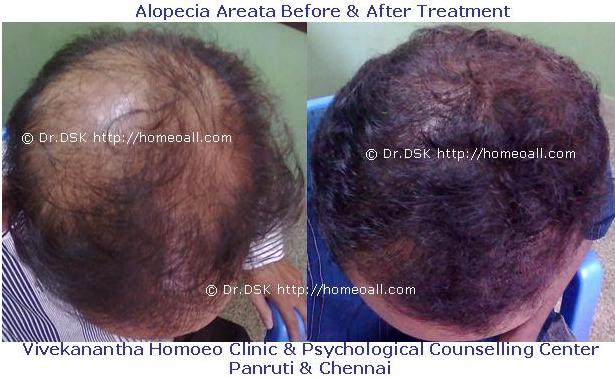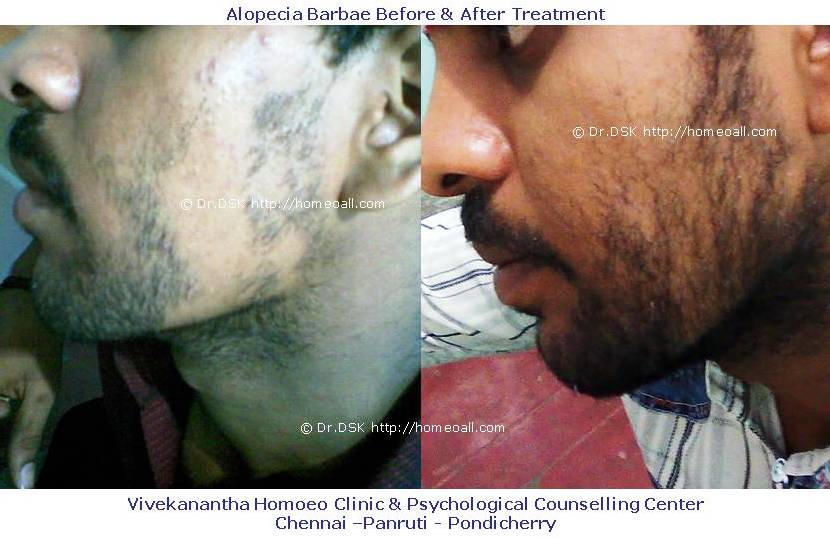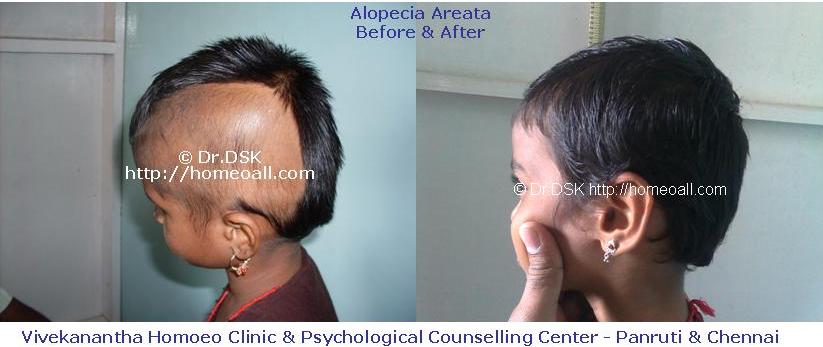
Alopecia Areata
- Alopecia areata is considered an autoimmune disease, in which the immune system, which is designed to protect the body from foreign invaders such as viruses and bacteria, mistakenly attacks the hair follicles, the tiny cup-shaped structures from which hairs grow.
- This can lead to hair loss on the scalp and elsewhere.
- In many cases, hair falls out in small, round patches about the size of a quarter.
- In some cases, the disease does not extend beyond a few bare patches.
- In few people, hair loss is more extensive.
- Although uncommon, the disease can progress to cause total loss of hair on the head (referred to as alopecia areata totalis) or complete loss of hair on the head, face, and body (alopecia areata universalis).
Reason for Alopecia Areata
- In alopecia areata, the immune system cells called white blood cells attack the rapidly growing cells in the hair follicles that make the hair.
- The affected hair follicles become small and drastically slow down hair production.
- Fortunately, the stem cells that continually supply the follicle with new cells do not seem to be targeted.
- So the follicle always has the potential to regrow hair.
- Actually doctors do not know exactly why the hair follicles undergo these changes, but they suspect that a combination of genes may predispose some people to the disease.
- In those who are genetically predisposed, some type of trigger–perhaps a virus or something in the person’s environment–brings on the attack against the hair follicles.
Psychological facts
- Most of the person feels this will spread to others-but this is not true
- Feels social withdrawal

This is a serious illness?
- Alopecia areata is not a life-threatening disease.
- It does not cause any physical pain, and people with the condition are generally healthy otherwise.
- But for most people, a disease that unpredictably affects their appearance the way alopecia areata does is a serious matter.
- The effects of alopecia areata are primarily socially and emotionally disturbing.
- In alopecia universalis, however, loss of eyelashes and eyebrows and hair in the nose and ears can make the person more vulnerable to dust, germs, and foreign particles entering the eyes, nose, and ears.
- Alopecia areata often occurs in people whose family members have other autoimmune diseases, such as diabetes, rheumatoid arthritis, thyroid disease, systemic lupus erythematosus, pernicious anaemia, or Addison’s disease.
- People who have alopecia areata do not usually have other autoimmune diseases, but they do have a higher occurrence of thyroid disease, Atopic eczema, nasal allergies, and asthma.

May I get my hair back!
- There is every chance that your hair will regrow, but it may also fall out again.
- No one can predict when it might regrow or fall out.
- The course of the disease varies from person to person.
- Some people lose just a few patches of hair, then the hair regrows, and the condition never recurs.
- Other people continue to lose and regrow hair for many years.
- A few lose all the hair on their head; some lose all the hair on their head, face, and body.
- Even in those who lose all their hair, the possibility for full regrowth remains.
- In some, the initial hair regrowth is white, with a gradual return of the original hair colour.
- In most, the regrown hair is ultimately the same colour and texture as the original hair.
Treatment in modern medicine
Local injections, Oral corticosteroids, Ointments or creams containing steroids are some treatments for alopecia areata. Keep in mind that while these treatments may promote hair growth, none of them prevent new patches or actually cure the underlying disease.
Homoeopathic Treatment for Alopecia Areata – Pulu vettu,
Symptomatic & constitutional Homoeopathic medicines works well in Alopecia Areata without any side effects
Whom to contact for Alopecia Areata Treatment
Vivekanantha Clinic Doctors treats many cases of Alopecia Areat, Puluvettu, with successful results. Many patients get relief after taking treatment from Vivekanantha Clinic. You can meet the Doctors at Vivekanantha Homeopathy Clinic, Velachery, Chennai 42. To get appointment please call 9786901830, +91 94430 54168 or mail to consult.ur.dr@gmail.com,
For more details & Consultation Feel free to contact us.
Vivekanantha Clinic Consultation Champers at
Chennai:– 9786901830
Pondicherry:- 9865212055
Panruti:- 9443054168
Mail : consult.ur.dr@gmail.com, homoeokumar@gmail.com
For appointment please Call us or Mail Us
For appointment: SMS your Name -Age – Mobile Number – Problem in Single word – date and day – Place of appointment (Eg: Rajini – 30 – 99xxxxxxx0 – Alopecia Areata, Puluvettu, – 21st Oct, Sunday – Chennai ), You will receive Appointment details through SMS
Puzu vetu, Puzhu vetu. Hair falling in round shape, coin like hair falling, hair falling in beard, hair falling in eye brows, patchy hair falling, vandu kadi, poochi vettu, poochi kadi, thalayil poochi vetu, hair falling treatment in Chennai, tamil nadu, panruti, cuddalore, villupuram, Pondicherry, புழு வெட்டு, பூச்சி வெட்டு, வட்டமாக முடி கொட்டுதல், தாடியில் முடி கொட்டுதல், மீசையில் முடி உதிர்தல், புருவத்தில் முடி கொட்டுதல், புழுவெட்டு குணமாக சிகிச்சை,
==–==